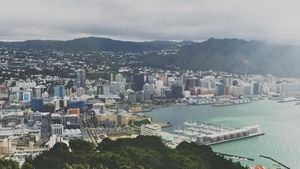SEOUL, South Korea — A political storm is brewing around South Korean President Yoon Suk Yeol following his controversial declaration of martial law, which was swiftly challenged by mounting opposition. Yoon, seeking to defend his decision publicly, stated during a fiery televised address, "I will fight to the end" against efforts to impeach him. The backdrop of his declaration echoes the anniversary of the 1979 coup led by Chun Doo-hwan, underscoring the historical weight of his actions.
The National Assembly has been engulfed by turmoil as opposition parties, led by the Democratic Party, have accused Yoon of attempting to incite violence and undermine democratic processes. The main opposition party submitted a new impeachment motion against the president, which is set to be voted on soon. This political strife has quickly escalated, leaving the country’s political apparatus paralyzed.
Yoon's martial law decree, enacted on December 3, was portrayed by him as necessary to uphold government order. He emphasized the importance of maintaining governance amid what he referred to as chaos created by the opposition. His remarks labeled the Democratic Party as "anti-state" forces, accusing them of destabilizing the country through legislative maneuvers aimed at breaching constitutional order.
The martial law, which lasted only six hours before being repealed after the legislature voted unanimously against it, brought hundreds of armed troops to key government buildings, including the National Assembly. Although military action was taken, the absence of major violence raised questions about the true intent behind Yoon's actions.
Critics quickly condemned Yoon's martial law as unconstitutional, stating it could only be justified under circumstances of war or national emergency, neither of which were present during its declaration. The Democratic Party called his decree nothing short of rebellion, asserting it was the right of lawmakers to vote without intimidation.
On December 12, as the political conflict intensified, investigations were announced to determine whether Yoon's actions amounted to rebellion or abuse of power. This puts him at risk of facing serious consequences, as allegations of rebellion can carry severe punishments, including the death penalty. The National Assembly took decisive action, voting to adopt measures allowing for the appointment of independent counsel to investigate allegations against him.
The conflict has prompted tribulations within Yoon's own party, the People Power Party (PPP). Party members are divided on how best to respond to this crisis, with some loyalists defending Yoon's actions fervently, arguing they were within his rights as president. Others, including critics like party chair Han Dong-hun, view Yoon's choices as reckless, threatening their political future. Han publicly referred to the president's declaration as “a confession of rebellion”.
Yoon's efforts to solidify his base have been seen as increasingly desperate, as he attempts to rally support against the impeachment motion. His statements have ranged from defiance to apologies, reflecting the tension within his administration as it faces rising opposition.
The imposition of martial law not only sent shockwaves through the political sphere but also sparked protests across the nation. Citizens expressed their outrage, with many gathering to call for Yoon's ouster outside the presidential office. Videos circulated on social media showing tense confrontations between police and protesters, illuminative of the deep divide within South Korean society over this issue.
The complexity of the situation escalated as Yoon's former defense minister, Kim Yong Hyun, was arrested due to allegations linked to the martial law implementation. Investigations also extended to law enforcement officials involved, leading to significant political ramifications as the anger fuelled calls for accountability.
This unprecedented political crisis has raised eyebrows globally, drawing attention to governance practices in South Korea. While some speculate about the potential for civil unrest, others question the president's capacity to maintain control over the executive branch during this trying time.
Yoon’s declaration has laid bare the fractures within the Korean political system, as alliances shift and new strategies emerge leading up to the impending impeachment vote. This chapter continues to evolve, with Yoon determined to prove his legitimacy and authority to both supporters and detractors.
The spotlight will remain on South Korea, where the looming possibility of impeachment hangs over Yoon’s presidency, reshaping the future of governance and public trust. Citizens and lawmakers alike await the verdict as debates intersect with the memories of past coups, leading to uncertainty about the pathways forward for South Korean democracy.



